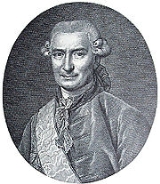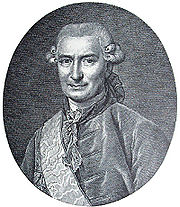
Ove Høegh-Guldberg
Encyclopedia

Denmark
Denmark is a Scandinavian country in Northern Europe. The countries of Denmark and Greenland, as well as the Faroe Islands, constitute the Kingdom of Denmark . It is the southernmost of the Nordic countries, southwest of Sweden and south of Norway, and bordered to the south by Germany. Denmark...
statesman, historian and de facto prime minister of Denmark, 1772–1784.
Biography
He was the son of a poor Jutlandish merchant. By the help of patrons he was educated a theologian, later he became a historian and 1761 a professor. Like many other middle class academics of his age he was a mixture of a patriotic common sense man and an orthodox royalist.1764 he was connected to the queen Juliana Maria of Braunschweig-Wolfenbüttel as the house teacher of her son, Frederick, from 1771 also as the latter’s cabinet secretary. In his new position he affected the prince with a Danish national and conservative spirit. This post was the precondition of Guldberg’s future political career. Being a conservative and devoted monarchist he quite made common cause with the opposition against the rule of Johann Friedrich Struensee
Johann Friedrich Struensee
Count Johann Friedrich Struensee was a German doctor. He became royal physician to the mentally ill King Christian VII of Denmark and a minister in the Danish government. He rose in power to a position of “de facto” regent of the country, where he tried to carry out widespread reforms...
regarding him a revolutionary and a usurper. At the making of the conspiracy against Struensee 1771 he was one of its leaders and perhaps its only real talent.
By the fall of Struensee 1772 Guldberg became the leader of the new government. Though never created a formal cabinet minister until shortly before his own fall he must be regarded the real prime minister of most of this period though hidden behind the Hereditary Prince as the regent. As years passed he advanced to first secretary (1776) and 1777 he was ennobled as Høegh-Guldberg. Like Struensee he mostly governed during direct cabinet orders relying upon his influence on the royal guardians of the insane Christian VII.
The “Guldberg rule” was marked by peace and rest and at start favoured by good financial conditions. As a neutral state Denmark enjoyed a mercantile high conjuncture during the American Revolutionary War
American Revolutionary War
The American Revolutionary War , the American War of Independence, or simply the Revolutionary War, began as a war between the Kingdom of Great Britain and thirteen British colonies in North America, and ended in a global war between several European great powers.The war was the result of the...
. In domestic politics he successfully carried through a national line making him popular among many commoners (Danish language in the army 1773 and especially the Act of Citizenship
Citizenship
Citizenship is the state of being a citizen of a particular social, political, national, or human resource community. Citizenship status, under social contract theory, carries with it both rights and responsibilities...
1776 that excluded foreigners from public posts of the monarchy). He also supported gifted Danish poets and authors including Jörgen Zoega
Jörgen Zoega
Jørgen Zoëga was a Danish archaeologist and numismatist; born at Daler near Tønder, near the west coast of northern Schleswig.-Biography:...
. Though an outspoken Danish nationalist he beyond any doubt also used it as a propaganda asset. A severe reverse of his rule was his financial disability and a growing corruption. Besides Guldberg showed no understanding of the problems of the peasants and he abolished most of the reforms of Struensee like he – though a provincial himself – totally favoured the capital at the expense of the provinces. The deaths and removal of some of his government colleagues (H.C. Schimmelmann
Heinrich Carl von Schimmelmann
Heinrich Carl von Schimmelmann was a German-born Danish nobleman, merchant and statesman.-Early life and career:...
, Andreas Peter Bernstorff
Andreas Peter Bernstorff
Andreas Peter Bernstorff was a Danish statesman and politician. He was a Danish minister, father of Christian Günther von Bernstorff, and a guardian of civil and political liberty.-Background and early career:A. P...
) enlarged his field of activity but also made him more vulnerable to critics.
Economic low conjuncture
Conjuncture
In general, a conjuncture is a period marked by some watershed event which separates different epochs.In economics, conjuncture is a critical combination of events....
s after the end of the American War of Independence undermined his popularity but most decisive was that he - like his royal employers Juliane Maria and the Hereditary Prince – had fallen radically out with the Crown Prince (afterwards Frederick VI
Frederick VI of Denmark
Frederick VI reigned as King of Denmark , and as king of Norway .-Regent of Denmark:Frederick's parents were King Christian VII and Caroline Matilda of Wales...
) whose growing opposition he seems to have ignored. April 1784 just as he had become appointed a minister he was forced to resign by the coup d’etat
Coup d'état
A coup d'état state, literally: strike/blow of state)—also known as a coup, putsch, and overthrow—is the sudden, extrajudicial deposition of a government, usually by a small group of the existing state establishment—typically the military—to replace the deposed government with another body; either...
of the prince. He was then reduced to the rank of an amtmand (prefect) until 1802.
Ove Høegh-Guldberg as a number of direct descendants, including the Australian biologist Ove Hoegh-Guldberg
Ove Hoegh-Guldberg (biologist)
Ove Hoegh-Guldberg , is the inaugural Director of the at the University of Queensland, and the holder of a Queensland Smart State Premier fellowship . He is best known for his work on climate change and coral reefs...
.

